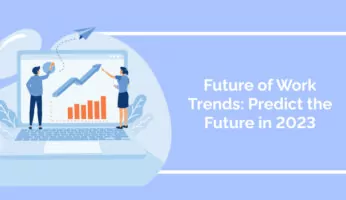
The pace of economic change is accelerating and today’s businesses need to be ready for a future that is digital, fast-paced, and uncertain. Being future ready means being able to adapt, grow, and innovate quickly.
In this post, we’ll explore six actions businesses can take to keep up with today’s evolving business world.
Is Your Business Future Ready?
Businesses need to start thinking about how they’re going to survive the future.
Being future-ready is no longer just about how to prepare yourself for the future, but how to embrace it. In order to do this, businesses need to be able to:
- Lead and manage change quickly and effectively
- Adopt new digital tools and integrate them seamlessly into the workplace
- Ensure that the workforce readily embraces the digital future
In today’s volatile times, it is hard enough to get a grasp of the present circumstances, let alone the future.
Let’s look at a few steps that businesses must take in order to stay competitive in the years ahead.
1. Automate as much as you can
Most research firms agree that automation is the future.
Forrester, for instance, has predicted that automation will become an imperative in 2021. And Gartner believes that hyperautomation and AI will become increasingly present in the enterprise.
These predictions certainly make sense – after all, automation platforms can generate significant productivity gains wherever they are applied.
Automation can be applied to virtually every area of a business, including:
- Marketing
- Employee training
- Customer service
- Decision-making
While automation certainly carries benefits for employees and employers alike, some workers are afraid of job displacement and hesitant to adopt automation tools.
For that reason, it is important to help employees stay skilled and productive by cultivating a culture of learning.
2. Cultivate a culture of learning
Since the workplace will continue evolving for the foreseeable future, employees need to become perpetual learners.
Employee training and independent study can certainly help in this regard. But to further improve employee productivity, organizations should cultivate a culture of learning where everyone is focused on growing and innovating.
Such a culture will improve employees’ desire to learn, which will, in turn, boost their performance and productivity.
To do this:
- Explain the benefits of continual learning to employees
- Make a business case for the value of learning and obtain buy-in from executives
- Create mechanisms to support continual learning, such as incentives and in-house training programs
- Use modern tools that enable seamless learning, such as digital adoption platforms (DAPs)
A culture of learning will not only improve employees’ performance, it will streamline the execution of organizational changes.
3. Integrate emerging technology into the business
There’s an old saying in the tech industry, “The best way to predict the future is to invent it.”
In order to stay ahead of the curve, therefore, it is necessary to be aware of the latest technology and how it can help your business – and, more importantly, to fully integrate that technology into the organization.
Here are a few examples of technologies that will transform the economy in the years ahead:
- AI
- The Internet of Things
- Data and analytics
- Automation platforms
The integration of emerging technologies into your business can make it more efficient, more profitable, and easier to run your business in general. Most importantly, businesses that don’t adopt emerging technology won’t be able to keep up in the digital future.
4. Redesign business processes and the organizational structure
Organizational transformation is becoming more necessary by the day.
Whether that transformation comes in the form of incremental change or radical shifts, many businesses will need to rethink their entire operating models.
After all, companies won’t survive the digital era if they keep doing things the way they’ve always done them.
Here are a few areas to focus on:
- Rearranging the organizational structure to match new business models
- Implement lean thinking to reduce waste and improve efficiency
- Adopt agile methods to boost resiliency and speed
- Use technology as a competitive differentiator
The idea behind changes such as these is to improve organizational resilience, agility, and speed – all of which will become increasingly mandatory in the uncertain times ahead.
5. Prepare the workforce
As mentioned, organizations need to train their employees for the jobs of the future instead of the jobs of the past. There are, for instance, many jobs that will no longer be relevant in ten years, but there will also be many that will be created in the future that don’t exist now.
Training is only part of the picture, however.
In addition to upskilling, employers will need to focus on areas such as:
- Job tasks and roles
- Mindsets and attitudes
- Culture and climate
- The digital employee experience
To help prepare the workforce, HR, IT, and other relevant specialists should work together to integrate culture and upskilling programs into a cohesive employee experience, as we’ll see below.
6. Redesign the workplace experience for the digital era
Those that can create a seamless digital employee experience will be able to attract the best workers and keep them more engaged and productive.
There are several components to a digital workplace, including the digital employee experience, in-house training programs, and the workplace culture. It is also important to pay attention to workplace trends, such as the work-from-home (WFH) trend.
To modernize the workplace, consider taking steps such as these:
- Adopt a hybrid office model
- Create a better digital work environment
- Invest in corporate wellness programs
- Implement remote working software
Many changes that occurred to the workplace during 2020 will become permanent. And, since the workplace will continue to evolve, modernizing the workplace will become another key component that contributes to organizational effectiveness.
WalkMe Team
WalkMe spearheaded the Digital Adoption Platform (DAP) for associations to use the maximum capacity of their advanced resources. Utilizing man-made consciousness, AI, and context-oriented direction, WalkMe adds a powerful UI layer to raise the computerized proficiency, everything being equal.



